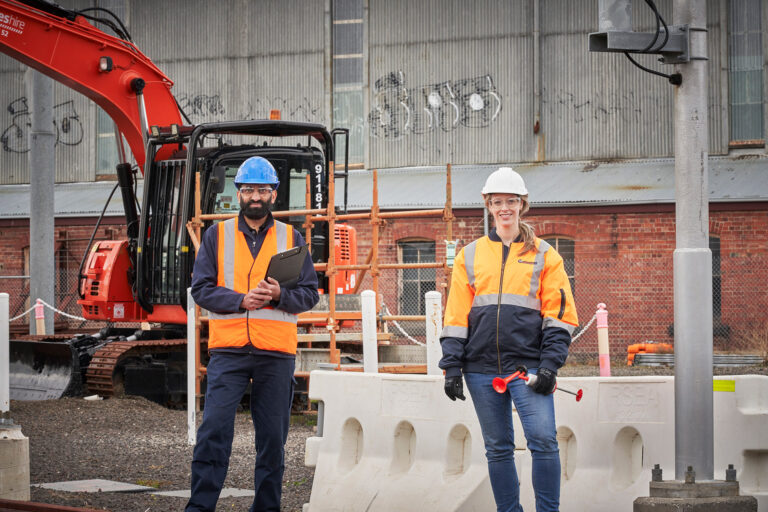What is Verification of Competency (VOC) in the Rail Industry?
Verification of Competency (VOC) ensures that employees possess the required knowledge and skills to perform their tasks safely and efficiently.
In January 2012, a new set of Workplace Health and Safety laws was introduced, placing greater responsibility on employers to take “all reasonably practicable measures to prevent the risk to health and safety occurring”.
Current Australian regulations now mandate that employers and ‘persons conducting a business undertaking’ (PCBU) must ensure that their workforce can unequivocally exhibit their proficiency in executing the duties associated with their job role.
What is Verification of Competency (VOC) certificate in rail?
Refresher Training, commonly referred to in the industry as a Verification of Competency, is a systematic assessment to demonstrate competency and prove a rail worker’s skills and relevant qualifications combined to operate equipment and fulfil the responsibilities of their role safely and expertly. It is particularly significant in industries with high-risk work and where safety is paramount, such as construction, mining, and rail.
Do workers need Verification of Competency (VOC) when they already have a licence?
A licence or ‘ticket’ will be necessary for a VOC evaluation. However, it is no longer sufficient to gauge a rail worker’s capacity to safely carry out their tasks and operate machinery in compliance with regulations. If you hold a qualification or licensure for a long time, a refresher training or assessment can help verify that you are still competent to the standard of current laws, policies and procedures of your industry.
Why do we need Verification of Competency?
Assessing for competency verification allows organisations to verify workers’ ability to perform tasks related to their roles. VOC assessments are often used in many industries in preparation for job searches, pre-employment checks, contract negotiations and site requirements.
For an individual, Verification of Competency is a validation of your skills, knowledge and experience. It assures employers that you have the relevant training and ability required to perform the tasks relevant to your job role safely and effectively. It enhances your employability, as employers increasingly require rail industry workers to hold a VOC before commencing work onsite.
As an employer or PCBU, a Verification of Competency is your assurance that your workforce is competent, reducing the risk of workplace incidents. According to Safe Work Australia, it is now the employer’s legal responsibility to undertake reasonable measures to ensure that the on-site staff’s skills are up-to-date and compliant with Workplace Health and Safety (WHS) regulations.
Is the verification of competency compulsory?
The WHS legislation requires employers to do due diligence and provides them with the duty of ensuring that the individuals under their employ are of current competence.
A VOC is typically required in the following situations:
- During the hiring process to ensure recruits possess the required skills.
- Regular assessments to maintain competency and keep up to date with changes in processes and regulations every 30 months or 2.5 years.
How does this benefit a business?
- Safety: Ensuring worker’s ability and competence through VOC assessments contributes to a safer work environment. It reduces the risk of accidents, injuries, and costly downtime.
- Compliance: With the implementation of National Workplace Health and Safety (WHS) harmonisation laws since January 2012, employers are legally required to ensure competency of their workforce. A VOC provides a tangible means to fulfil this requirement, showcasing due diligence and organisational commitment to safety.
- Insurance: Many organisations are bound by insurance requirements that mandate completing “refresher courses” for certain competency units. Even though these units may not have specified expiration dates, keeping workers’ skills up-to-date is essential to satisfy insurance prerequisites. The VOC process guarantees that employees maintain proficiency, fulfilling insurance requirements and reducing the risk of potential coverage gaps.
How do you verify competency?
The assessment process is conducted by a qualified assessor onsite or at a training facility. Before VOCs are conducted, participants must provide their relevant licence or Statement of Attainment along with relevant work documents or logbooks.
The details vary depending on the industry and the tasks being assessed, but the operator is typically evaluated via theory testing and practical assessments or demonstration of skills. Successful operators can proceed to work.
What happens if I am not competent?
If an individual is found not competent during a VOC assessment, they may need to undergo gap training or upskilling to meet the required standards. Until they are competent, they should not perform tasks for which they are not certified.
How long does refresher training take?
The duration of a VOC assessment varies based on the complexity of the tasks being assessed and the employer’s or site’s requirements.
Who can conduct a Verification of Competency?
A qualified assessor must only conduct VOC assessments with the necessary expertise and thorough understanding of the industry competency standards in the national training packages.
To enquire about CERT’s refresher training, contact us at 1300 042 3780 or click your state below to pick the right training for you:
Enrol in CERT Training now and complete your VOC in a professional and trainee-friendly environment.
To stay updated about rail industry practices, key safety information and best practices, follow us on our social media: Facebook and LinkedIn.
-
How Much Do Train Drivers Earn in Australia?
Many people look for high-paying jobs that don’t require a university degree. One such career is train driving, offering competitive train driver salary across…
-
What Rail Medical Do I Need as an Industry Worker?
To prove that you are healthy and fit to do your job, you are required to pass various rail medical examinations, conducted in line with the National Standard for Health Assessment of Rail Safety Workers.
-
Where can I find rail jobs around Australia?
Australia is criss-crossed by railways that offer a key service to industry and the public. Freight rail covers the nation and links states, regions…



